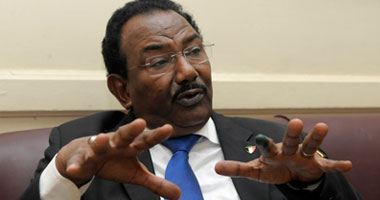“No political motive” behind Sudan’s support for Ethiopia’s Nile dam: ambassador
By Tesfa-Alem Tekle
December 14, 2013 (ADDIS ABABA) – Sudan’s support to Ethiopia’s controversial dam project is not politically driven, Sudan’s ambassador to Ethiopia said on Friday.

“We are not playing a political role”, he said, adding that “Sudan genuinely supports the project”.
The Sudanese diplomat said his country will continue to extend the necessary support to the multi-billion dollar project as long as Khartoum remains convinced that the project is beneficial to Sudan, Ethiopia and Egypt.
Egypt fears that the $4.6 billion hydropower plant, which Ethiopia is building on the Blue Nile, will diminish its share of the river’s water, arguing its historic water rights must be maintained.
Ethiopia is the source of around 85% of the Nile’s water, mainly through rainfall in its highlands. Over 90% of Egyptians rely on water from the Nile’s flows.
In June, a panel of international experts who were tasked by the three countries to study the impacts of the Ethiopian dam on lower riparian countries, including Sudan and Egypt, found that the dam project will not cause significant harm to either country.
Cairo remains unconvinced and has sought further studies and consultation with Khartoum and Addis Ababa.
Sudan, however, has accepted the final findings and offered to send experts and technicians to help in the dam’s construction, a move welcomed by Ethiopia.
Once completed, the project is expected to have a generation of capacity of 6,000 megawatts, with Ethiopia hoping to export electricity to its East African neighbours, as well as Egypt.
The water ministers of Ethiopia, Egypt and Sudan met for the second time in Khartoum a few days ago to discuss ways of implementing the recommendations made by the international panel of experts.
Although the ministerial meeting failed to reach a breakthrough on outstanding issues, government officials at Ethiopia’s ministry of water, irrigation and energy told Sudan Tribune that the three sides have agreed on the establishment of a tripartite committee to deal with existing differences, particularly with Egypt.
SUDAN, ETHIOPIA DEAL
With regard to cooperation agreements signed recently between Sudan and Ethiopia, the Sudanese ambassador expressed his government’s commitment to implement them.
Concluding a two-day of meeting of the High-Level Joint Commission last week in Khartoum, Sudanese president Omer Hassan Al-Bashir and Ethiopian prime minister Haile Mariam Desalegn inked 14 agreements and memorandums of understanding to enhance their cooperation in a range of fields, including on trade, aviation services and preventing human trafficking.
“We are very keen to implement the agreements signed between Sudan and Ethiopia”, the ambassador said.
He noted a need for the two countries to take practical actions to implement the agreements that aim to boost economic and security cooperation of the two neighbours.
Al-Katim said a mechanism that follows up the implementation of the signed agreements should include all levels of government, including the concerned ministries of both countries.
(ST)
